Megan Dunn – 11 February, 2014
So what does a gleaner's garden look like? A prescription for alternative living: The Good Life updated for the art scene in 2014. I could be cynical about this show - as a stereotypical Gen-Xer I remain tied to the mast of unfashionable irony - but the work is presented with a sense of completeness, of total immersion. Cheng and Dryburgh are sincere. In 2013 Cheng volunteered at a conservation project in Cambodia, Dryburgh's career is underpinned by collaboration.
Wellington
Xin Cheng and Kirsten Dryburgh
Gleaners’ Garden
22 January 22 - 15 February 2014
The word glean has a leanness to it, I love its elongated vowels, that long e gives glean a tasty sheen. I’ve never been a gardener. Maybe I’m a pirate and not a farmer? I can’t be sure yet because I haven’t read Dave Hickey‘s new book of essays about the art world. And being a pirate is probably not a diagnosis one can accurately self prescribe. However, farming is also a topical metaphor in the local art community right now due to the uncertain harvest of Freedom Farmers, a group exhibition of twenty New Zealand artists curated by Natasha Conland.
Gleaners’ Garden is the product of the Enjoy Summer Residency by Xin Cheng and Kirsten Dryburgh, but it’s tempting to approach the show as the Wellington outpost of Cheng‘s work in Freedom Farmers. At Auckland Art Gallery Cheng’s installation Propositions includes edible plants, shelving strung up by bicycle chains and a tyre tree. Gleaners’ Garden shares the same social conscience; the same green heart. Everything in the show has been salvaged from the local area. According to the Enjoy press release, Cheng and Dryburgh travelled from Auckland to Wellington, “carrying only a selection of favourite tools and their exercise routines.”
So what does a gleaner’s garden look like? A prescription for alternative living: The Good Life updated for the art scene in 2014. I could be cynical about this show - as a stereotypical Gen-Xer I remain tied to the mast of unfashionable irony - but the work is presented with a sense of completeness, of total immersion. Cheng and Dryburgh are sincere. In 2013 Cheng volunteered at a conservation project in Cambodia, Dryburgh’s career is underpinned by collaboration.
On the floor at Enjoy a distiller emits small flurries of steam as though the gallery is a campsite recently vacated. Signs of occupation are everywhere: a black trampoline cover has been stretched between the wall and ceiling to form a half cave; next to the windows, buckets of foliage, leaves and stray branches wait in the sunlight; a vase of concentrated brown sap basks on the windowsill. At a glance it’s unclear whether this heady brew is being harvested for its looks or healing properties. I suspect both are at play. Yet the sap doesn’t come with a tag round the neck: drink me. The utilitarian aspirations of the residency are simultaneously obvious and oblique.
A piece of industrial sacking forms an unusual funnel over one open window. Apparently, this is a strategy to keep the scents at knee height. The artists wanted the exhibition to be a sensory experience. And it is. Pine needles flake over the wooden floorboards. I’m not entirely sure which of my five senses was most stirred, but my curiosity was definitely aroused. I saw this exhibition twice.
The artists gathered Kawakawa and Manuka from the Nga Hau e wha o Paparangi marae in Newlands:
• Kawakawa is a blood purifier in cases of eczema, boils, cuts, wounds, rheumatism, ringworm, itching, sore feet and all forms of kidney and skin ailments.
• Manuka is an antisceptic, an inhaling vapor good for internal complaints such as coughs, colds, fever, and other lung conditions.
I know these answers not because I gleaned them but because I asked new curator, Emma Ng. Each day the gallery distills a different plant but it seems unlikely the sap created during the exhibition will be used beyond display. Therein lies the rub.
Freedom Farmers has been criticised for its vague curatorial premise. Caution: it’s not easy to deliver on a vision of utopia. The tyre tree Cheng made for Freedom Farmers was inspired by Paul Hogan’s book, Playgrounds For Free: the Utilization of Used and Surplus Materials in Playground Construction published by MIT Press in 1974. But at the Auckland Art Gallery Cheng’s tyre tree can’t be played on.
The artist’s resourcefulness in Gleaners’ Garden is also in danger of becoming steeped in vagueness or distilled down to aesthetics. An arrangement of beige tubes and anonymous items of cardboard packaging on the gallery floor at Enjoy affords a rudimentary chic. A beggar’s home waiting for Ikea assembly? A video of Cheng and Dryburgh in the process of making the show plays in the corner. Every tool teases: Look, I’m self-sufficient. The handmade barefoot sandals strewn about Enjoy are the footprints of a nomad with know-how. But does the force of the foraging on display here represent a change for good?
I only know the handmade barefoot sandals are not in my size. Yet, I believe in the integrity of Gleaners’ Garden. I understand the value and beauty of its proposition. The Enjoy opening was supported by Hardieboys Ginger Beer; given another week or two on the residency the gleaners might have made their own. Gleaners will save the earth or if they can’t save it, they will boil billycans of herbal tea beyond the apocalypse and repopulate in small clans. Lessons will be learned. The felt will be brushed. The Gleaners Garden Journal features a delightful picture of Xin’s Wool Tool.
This delicate book was printed on a mimeograph at the opening. Consult the journal for Summer Sauté 1, 2 and 3 and an itemized account of Cheng’s Wellington wardrobe. I’m not someone who packs a yoga mat on my travels but I was endeared to this Richard Scarry reference book for those healthy of mind, body and soul. I also adored the faint fey sketches of the herb garden printed on mismatched blue pages. The gleaners’ lexicon includes more than parsley, sage, rosemary and thyme.
Gleaners’ Garden is sensitive but - crucially - not fragile. What the artists don’t know yet, they will discover. Practicality is embraced, perhaps with a touch of puritanism, but Cheng and Dryburgh do have the moral high ground on their side.
Megan Dunn
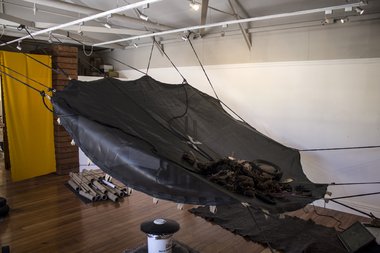

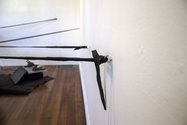
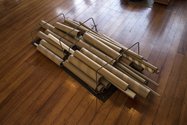
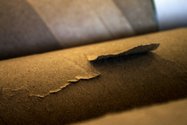
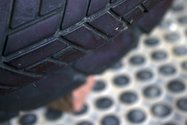
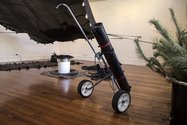
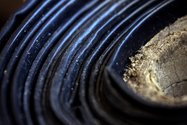

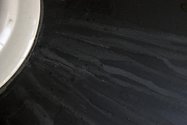
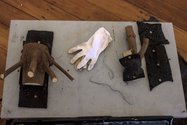
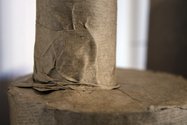
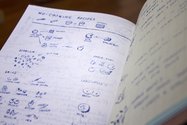
 Two Rooms presents a program of residencies and projects
Two Rooms presents a program of residencies and projects Advertising in this column
Advertising in this column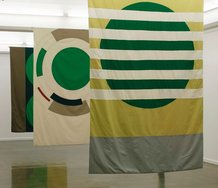
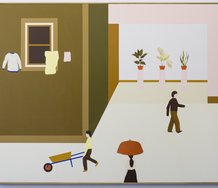
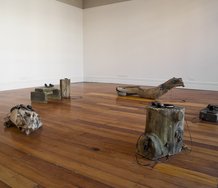
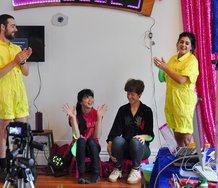
This Discussion has 0 comments.
Comment
Participate
Register to Participate.
Sign in
Sign in to an existing account.